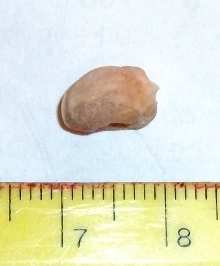Bladder Stones: Guinea Pigs
Guinea pigs often develop bladder stones composed of calcium carbonate. This can be the result of improper diet and cause a bladder infection. The bladder stones of guinea pigs cannot be dissolved with special medications or diets.
In order to reduce the risk of bladder stones, make sure your guinea pig drinks plenty of water. Provide bottled drinking water (without a vitamin C additive) low in mineral content if you live in areas with hard water. Sometimes adding a small amount of fruit juice to the water may increase drinking, but the water would need to be changed daily and the water bottle cleaned and disinfected daily.
Do not feed guinea pigs alfalfa pellets or hay. Also avoid dark leafy green produce high in calcium. The high calcium levels in some foods may increase the risk of bladder stone formation.
Other tips for preventing bladder stones:
-
Provide daily vitamin C by a pill such as Oxbow's Daily C or a liquid supplement for humans. Your guinea pig should get at least 90 mg a day. As stated above, do not use the vitamin C that is dissolved in the water!
-
Provide moist produce that is high in vitamin C (bell pepper, parsley, cilantro, and limited amounts of oranges). A study by Dr. Hawkins at the University of California (Davis) found that guinea pigs that were regularly fed bell peppers had a lower incidence of bladder stones, but the reason for this is not understood.
-
Offer no more than 1/8 of a cup of guinea pig pellets a day. Timothy hay should be present at all times, along with fresh grass or browse (such as mulberry leaves or hibiscus leaves), and moist produce.
-
Clean the litter box daily, and spot clean the cage daily to remove urine and feces. Guinea pigs like to stand where they urinate and defecate. This may allow bacteria to travel up the urethra and into the bladder. The more dirty the cage bedding, the more bacteria that are there to cause an infection.

Guinea pigs with bladder stones may benefit from vitamin E supplements and glucosamine (e.g., Cosequin) sprinkled onto the food.
Any guinea pig that is having trouble urinating, losing weight, or just acting unusual could have a bladder stone. X-ray films and an ultrasound may help confirm that a bladder stone is present. Unfortunately, surgery to remove the bladder stone is usually needed. Males are at risk of life-threatening blockages since the bladder stone can get stuck in the penis, and are more likely to be diagnosed with bladder stones than females. Due to their different anatomy, female guinea pigs may urinate out small bladder stones, but in rare cases they too will retain the smaller stones that grow into bigger stones.



